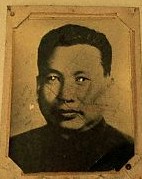
'Pol Pot - withdrawn traces, bye bye' - Revol

'Pol Pot - withdrawn traces, bye bye' - Revol
POL POT
also called POL PORTH, TOL SAUT, SALOTH SAR, or SALOT SAR (born May 19, 1925/28, Kompong Thom province, Cambodia - reported dead April 15, 1998, near the Cambodia-Thailand border), Khmer political leader whose totalitarian regime (1975-79) imposed severe hardships on the people of Cambodia. His radical communist government forced the mass evacuations of cities, killed or displaced millions of people, and left a legacy of disease and starvation.
Pol Pot was born into a peasant family and stayed in a Buddhist monastery, according to his own account, for six years, two of which he spent as a monk. He studied carpentry for a year at a technical school in Phnom Penh. In the 1940s he joined the anti-French resistance under Ho Chi Minh, and from 1946 he was a member of the Cambodian Communist Party. He went to Paris in August 1949 to study radio electronics but spent more time on revolutionary activities than on his studies. His scholarship was cut short after he failed examinations, and he returned to Phnom Penh in January 1953.
Pol Pot taught at a private school in Phnom Penh from 1954 to 1963 but left the capital because his communist ties were suspected by the police. He spent the next 12 years building up the Communist Party that had been organized in Cambodia in 1960, and he served as the party's secretary. An opponent of the Norodom Sihanouk government and of the military government of General Lon Nol, he led the guerrilla forces in their overthrow of Lon Nol's regime in 1975. Pol Pot was prime minister of the new Khmer Rouge government from 1976 until he was overthrown by invading Vietnamese in January 1979. Under the leadership of Pol Pot, it is estimated that from 1975 to 1979 his government caused the deaths of at least one million people from forced labour, starvation, disease, torture, or execution.
Following the Vietnamese invasion of his country, Pol Pot withdrew to the mountains of the southwest to lead the Khmer Rouge forces against the new Hanoi-supported government in Phnom Penh, which refused to consider peace negotiations as long as he remained at the head of the party. Although officially removed from the military and political leadership of the Khmer Rouge in 1985, he apparently remained a guiding force in the organization.